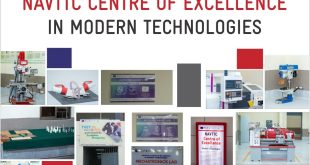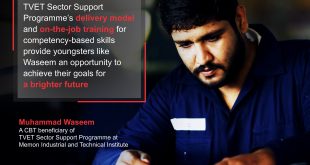When devastating floods hit southern Punjab in 2010, the historic city of Multan became the base camp for local and international humanitarian and relief organizations. From Multan, they disbursed relief goods to the neighbouring districts which had become inaccessible due to severed road links.
The logistical support came from the Pakistan Army, emergency response teams and volunteers who used boats or waded through flood waters to reach the trapped people.
A good two years down the road the same city is coming to the aid of a group of flood-affected youth in a unique way. The Vocational Training Institute (VTI) Multan, run by the Punjab Vocational Training Council (PVTC), is holding a welding and fabrication training course for 33 students under the Fund for Innovative Training (FIT) created under the Technical and Vocational Education and Training (TVET) Reform Support Programme.
The programme is a multi-lateral initiative co-funded by the European Union (EU), the Royal Embassy of Netherlands and the Federal Republic of Germany, being implemented in Pakistan by the German development agency, GIZ.

Hailing mostly from families who lost their homes and belongings in the disaster, the youth enrolled in this project are living in Multan and learning skills that will enhance their chances of finding well-paying jobs. The best part of the story is that these boys are being trained free of cost and are even paid Rs 2,000 as a stipend. Free books and uniforms and the great care and respect they are getting are the additional benefits the course entails.
 “We reached out to communities in flood-hit areas and looked for the most deserving candidates. Those who seemed serious and full of resolve to bring their families out of poverty, stood a good chance,” says Syed Rizwan Maqbool, Deputy Manager (South), PVTC and Acting Principal, VTI, Multan.
“We reached out to communities in flood-hit areas and looked for the most deserving candidates. Those who seemed serious and full of resolve to bring their families out of poverty, stood a good chance,” says Syed Rizwan Maqbool, Deputy Manager (South), PVTC and Acting Principal, VTI, Multan.
 Jafar Raza, 21, is one such student enrolled in the programme. He is from the district of Rajanpur and belongs to a family of five. Jafar lost his father years ago and the family depends on the meagre income of his elder brother who teaches at a private school.
Jafar Raza, 21, is one such student enrolled in the programme. He is from the district of Rajanpur and belongs to a family of five. Jafar lost his father years ago and the family depends on the meagre income of his elder brother who teaches at a private school.
“The floods took away whatever we had. Our house was razed to the ground and we had no roof over our heads. Life has become tough for us but I have not lost hope,” he says.
There is no VTI in Jafar’s district so when he heard about the launch of this course, he came to Multan. A hardworking young man, he lives with several other course mates in a house they have rented. “We spare a portion of our stipends to pay the rent which is quite nominal. The VTI staff helped us a lot in finding the accommodation and convincing the owner to charge us less,” he explained.
According to Zubair Bashir, Admission and Placement Officer (APO) at VTI, Multan. the methods used to reach out to target communities were many. For example, the VTI advertised in newspapers, placed banners at different places, asked its graduates to spread the message by word of mouth and distributed pamphlets in areas devastated by floods.
The response was overwhelming and the VTI received a large number of applications. This did not surprise the APO who knows welding and fabrication are professions high in demand in the region where a lot of reconstruction work is underway. Besides, the southern Punjab is a hub of heavy industry and all these industrial units require regular repair and maintenance work.
 “All these industrial units need qualified welders and fabricators on a regular basis,” says Ishtiaq, who manages the employment record of all the students who have passed out from the VTI since 2002. He knows where all of them are working or have worked in the past.
“All these industrial units need qualified welders and fabricators on a regular basis,” says Ishtiaq, who manages the employment record of all the students who have passed out from the VTI since 2002. He knows where all of them are working or have worked in the past.
One other thing he also knows is that the graduates of the FIT programme will have a ready demand in the market as they will be trained to operate the latest branded TIG and MIG machines in use by the industry. These superior quality machines and a 22 KV generator have been purchased with the funds provided by the donors.
Faiz-ur-Rehman, 21, is a trainee who hails from Jalalpur Pirwala. He had done his graduation in social studies but had so far failed to find a job. Unable to continue his education for the lack of resources, Faiz is struggling hard to earn a livelihood and look after his family comprised of 10 members.
Initially, when he came to know about the course through a newspaper advertisement, he was double-minded. He was apprehensive about what people would say about a graduate joining a welding course. But ultimately he put his reservations aside and applied.

Now he says, “I am glad I availed this opportunity. The trades I have learnt are high in demand. Unlike the boys who are maltreated at welders’ shops and asked to do menial tasks, we get respect and both theoretical and education knowledge.”
Faiz is half way through his course. Once he passes out, he plans to get a job at an industrial unit nearby and later on, try his luck oversees. “Sooner or later, I will have to go abroad and find a high-paying job,” he states. “I need lots of money to rebuild my house which was washed away by the floods. I know a lot of welders and
“The VTI trainers do not have to satisfy the project evaluators whenever they come. The projects, including the huge shed built by the trainees, speak volumes of the skills they posses,” says the Acting Principal.
Muhammad Mehboob, 19, comes from Bund Bosan, not too far from Multan. He found it hard to reach the institute at 8 am so he decided to stay in the city and share rented accommodation with other students. “The VTI has a zero tolerance policy for habitual latecomers,” he states. “In the beginning I felt uncomfortable but now I am quite used to the routine. It has helped me discipline myself which in itself is considered an additional qualification in the job market.
 Pakistan TVET REFORM Support Programme Technical and Vocational Education and Training (TVET) Reform support Programme
Pakistan TVET REFORM Support Programme Technical and Vocational Education and Training (TVET) Reform support Programme









